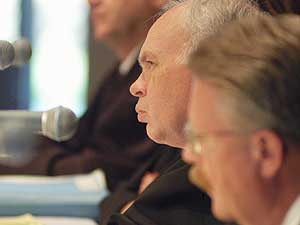|
Photos
Your Voice
|
Bill Janklow appeals his conviction to South Dakota Supreme Court
November 16, 2004
Former South Dakota Governor Bill Janklow appealed his manslaughter conviction before the South Dakota Supreme Court, Tuesday. Janklow was convicted last December for the traffic accident that killed a Minnesota motorcyclist Randy Scott. Janklow was sentenced to 100 days in jail and three years probation. In South Dakota, all felony convictions are automatically appealed to the state Supreme Court.
Mitchell, S.D. — Bill Janklow was not present at the oral arguments before South Dakota's Supreme Court. But the theater at Dakota Wesleyan University in Mitchell, was packed with students and the curious. Janklow's lawyer said the trial judge made several mistakes. In order to convict someone of manslaughter or reckless driving, South Dakota state law says there has to be a conscious disregard of the outcome. Conscious is the key word here.
Defense attorney Ed Evans represented Bill Janklow. Evans said Janklow was in a diabetic stupor at the time of the accident. The attorney claimed Janklow's judgement was impaired and that he was not conscious of the outcome of his actions. Evans said the trial judge failed to properly instruct the jury about the definition of the term unconscious. Evans said legally, it means your judgement is impaired because of your medical condition.
 | |||
One judge asked Evans if defense experts defined the term during the trial.
"From a medical standpoint they talked about confusion and the sugar, and how it impacts the brain, but they never said the legal definition of conscious or unconscious is as follows," Evans said. "They talked in medical terms, not in legal terms which again is important why we needed the term defined from a legal standpoint as to what unconscious means under the law."
The state's attorney said the common sense definition of unconscious is enough in this case. Patricia Archer, Assistant Attorney General, said the evidence proved Janklow was driving recklessly and knew the risks when he hit Randy Scott. She described the evidence leading up to the accident. First, Janklow passed a car at a high rate of speed.
"Finally, you've got him at the last split second," Archer said. "He yells out a warning to Brandlin (passenger in the car), 'Look out,' and he slams on his breaks. His own expert testified that those breaks were fully engaged. The defendant had hit the breaks. Now somebody who was unconscious, even under the defendant's proposed theory would not have had even enough awareness to do that. That's the state's position."
Archer told the Supreme Court the jury made the decision and the court should uphold it. Evans countered the judge wrongly admitted Janklow's driving record. That included a history of speeding tickets and two near-misses in traffic. Evans asked that the convictions be over turned, dismissed or that the court order a new trial.
Five circuit judges will decide the case. All members of the Supreme Court disqualified themselves because Janklow appointed them while he was governor. The replacement court will rule at a later date.
|
News Headlines
|
Related Subjects
|

